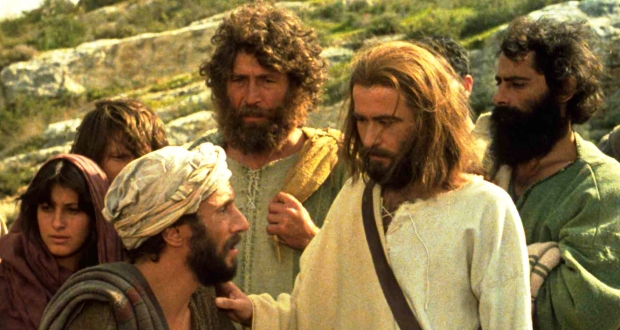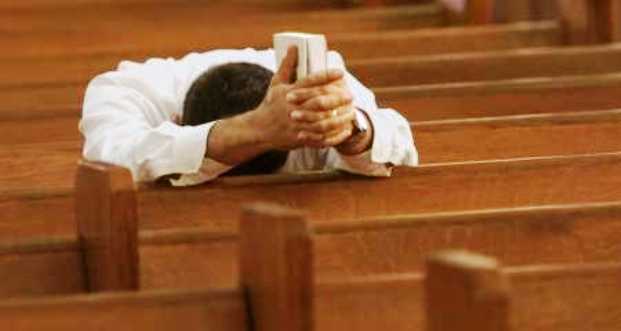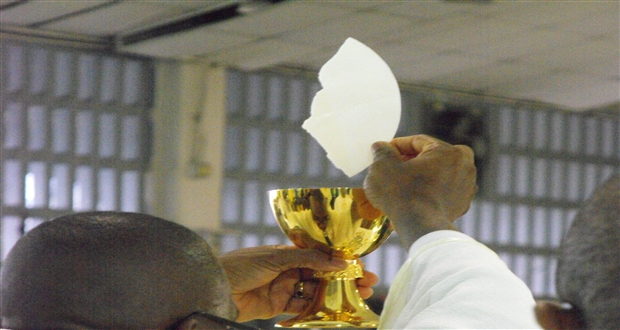Behold The Lamb Of God

Gospel: John 1:29-34
John the Baptist saw Jesus coming toward him and said, “Behold, the Lamb of God, who takes away the sin of the world. He is the one of whom I said, ‘A man is coming after me who ranks ahead of me because he existed before me.’ I did not know him, but the reason why I came baptizing with water was that he might be made known to Israel.” John testified further, saying, “I saw the Spirit come down like a dove from heaven and remain upon him. I did not know him, but the one who sent me to baptize with water told me, ‘On whomever you see the Spirit come down and remain, he is the one who will baptize with the Holy Spirit.’ Now I have seen and testified that he is the Son of God.”
Homily
(Archbishop Joseph Harris)
As the world remains mesmerized by the actions of Pope Francis, it is very possible for us to focus on Pope Francis’ actions and forget that his actions are the validating source of all that he has said. It is important therefore to know what Pope Francis has said. One of the important concepts that the Pope has left with us is the concept of the missionary dimension of baptism and confirmation. To be baptized and confirmed carries with it the obligation to make Jesus’ words and actions, as well as the words of sacred scripture understood, accepted and imitated in ways that make these words and actions relevant for the present era.
The gospel passage given to us by the church for our meditation this weekend is St. John’s account of the baptism of Jesus and gives us another look at this important event in Jesus’ life.
While last weekend, the Gospel according to Matthew presents Jesus as “the beloved Son in whom the Father is well pleased,” St. John presents Jesus as “the Lamb of God who takes away the sin of the world”. It is important for us then to understand what this phrase, “the Lamb of God who takes away the sin of the world” means.
The word “Lamb” gives an impression of someone who is passive, someone “meek and mild”. Jesus was not that kind of person, however, and so we need to imagine (from experience) a “lamb” who is powerful and energetic and effectively “takes away” sin from our community. The biblical tradition stresses two aspects of the lamb. First, his blood is shed as a source of life to others. The model is the lamb whose blood was sprinkled on the door posts on the night of the Exodus. Leaders are “lambs” to the extent that they are ready to accept the sufferings involved in leadership. This is not to say that suffering is a value in itself (as Christians have often done); what it tells us is that true leaders do not stand aloof and are not afraid to make themselves vulnerable. They accept the suffering that goes with leadership: being criticised unfairly; being disappointed in people; the occasional failure.
– Secondly, the lamb is not violent. This is well expressed in Isaiah 53:7, “Harshly dealt with he bore it humbly, he never opened his mouth, like a lamb that is led to the slaughter-house, like a sheep that is dumb before its shearers, never opening his mouth”. Leaders who are “lambs” are prepared to suffer violence against themselves, but refuse to inflict violence on anyone, certainly on those whom they lead. We must also focus on the words “of God”. Jesus knows himself to be “God’s lamb”; he is self-confident, therefore, not self-pitying, he knows he is secure in the hands of God.
Secure in God’s hands, Jesus struggles against the status quo. He does not accept sin as normal or inevitable; he struggles against sin in order to ensure that the Kingdom takes root.
It is important to remember at this juncture the missionary dimension of our baptism and confirmation. Through these sacraments, those baptized and confirmed accept as their own the mission of Jesus. Like Jesus therefore and following his pattern each one of us is called to be “Lamb of God, taking away the sin of the world.” Unfortunately we tend to look at activists in a slightly negative manner and so we very often refuse to see Jesus as a non-violent activist who does not only oppose sin in theory but actually takes it away. Because we refuse to see Jesus as the non-violent activist, we tend to say that evil is part of life and we have to accept it. We pray for sinners and very humbly say that we are all sinners while doing nothing to remove the structures of sin which cause so much evil amongst us. And so we fail in taking on as our own the mission of Jesus. We do nothing to “take away the sin from our world.”
There are however certain persons who have taken the mission of Jesus as their own. They take away the sin of the world. They refuse to accept drug dens in their communities; they fight against human trafficking; they report child and sexual abuse; they make sure that the Kingdom of God begins to flower around them. Because of their efforts they very often suffer violence against themselves and yet refuse to be violent to the perpetrators of the sin of the world. They accept the suffering which goes with leadership; being criticised unfairly; being disappointed in people; the occasional failure. Like Jesus, they become “lambs of God” secure in their convictions that God is with them; that they are doing God’s work; that the Kingdom will be built and the sin of the world is taken away. May you and I, baptized and confirmed, make the mission of Jesus, our own.
Prayer
All powerful and ever-living God your purpose for the world has never changed. You still desire harmony for this world but this will come only through “the lambs of God” who take away the sin of the world. Help us your people to take up the challenge of being agents of your purpose wherever we find ourselves, especially in our homes, workplaces and places of recreation. We ask this through the intercession of Mary, our mother and Jesus, your son. Amen






